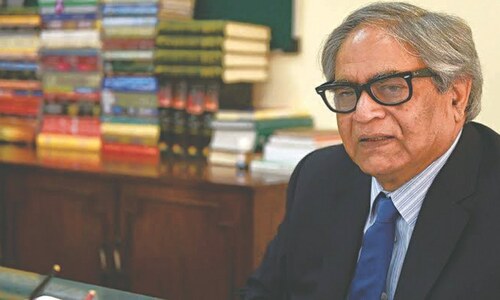Even Tarrar, the youngest of the trio and with a lifetime of populist writings to his credit, has started speaking in philosophical terms. A crowd-puller not just due to his writings but also his showbiz stints, Tarrar has aged gracefully, and with the force of critical acclaim behind him, he has a presence that is as pleasant as it is substantial.
During his session, Tarrar spoke about the frequent mention of water, birds and death in his travelogues and novels. He rationalised the first theme with his being a son of the land of five rivers, Punjab. For the second one, he mentioned the influence of Mantiq-al-Tayr (The Conference of the Birds) by Sufi saint Farid Al-Din Attar and cited examples from global literature which, Tarrar insisted, could not have been written without the writer having first read Attar.
When it came to death, Tarrar called it the “ultimate reality that lends beauty to everything beautiful … credibility to everything credible … and substance to everything substantial.” He was not just articulate but also convincing in his argument. His pleasant demeanour and characteristic soft smile for a moment even made death an interesting subject.
In a session dedicated to his novel Udas Naslain, Abdullah Hussein recounted the tale of the novel. Calling himself an “accidental writer,” he talked of his discomfort with the Urdu language in his formative years because “everybody advised me to develop a command over English or else there would be nothing for me in terms of a livelihood.” It was this lack of command over Urdu that gave birth to a fresh idiom that Hussein had to coin per force.
Translated as part of the Unesco Collection of Representative Works in Global Languages, Udas Naslain encouraged Hussein to write more. While all of his works have done well, none has come close to the ‘accidental’ debut’s status.
Though not quite as accidental a writer, Intizar Husain, the doyen of all Urdu writers, talked of the beginnings of his writing career, which related to his imagining what his small town would look like under curfew which was on the cards in the wake of Partition. “I started jotting down a few lines back in Diba’ee in 1947, but completed it in Lahore a year later,” he recalled, asserting that he had never thought of either moving to Pakistan or taking up writing as a profession, but did both. Life, as they say, is stranger than fiction.
Marking the 25th anniversary of his celebrated novel, Basti, Intizar Sahib spoke at length about the force of history that decimates everything that comes in its way: “History didn’t ask us, the common man, then, and it doesn’t ask us today. We just have to put up with it.”
The Kalabagh Dam, he said, was the most appropriate metaphor for today’s Pakistan. The remark, deeply insightful, witty and literary as it was, went down well with the audience. Intizar Sahib was surely the luckiest of the three Husains as he got a moderator (Asif Farrukhi) who knew what he was supposed to do. The other two sessions suffered on that count and had the writers not taken control of the discussion, the audience would have suffered a great deal too.
To be precise, the first 13 minutes of the 60-minute session with Tarrar were consumed by the moderator reading from a prepared text. Even when one of the organisers went up to him and suggested that Tarrar should at least be called on stage, he was too immersed in his grandiosity to bother. It was just as well that when Tarrar Sahib did come on stage, he took complete control of the proceedings and the moderator could hardly utter a word during the remaining session. For the audience, it was a welcome relief.
Abdullah Hussein’s session was moderated by someone who was overbearing and whose line of questioning was frequently below the belt. When it got a bit too much, Hussein saved the day with his wit. “I really can’t understand what you are saying … All I can do is agree with you regardless of what I am agreeing to.” When the floor was opened to the audience, the moderator remarked that it will be perhaps futile because Abdullah Sahib would ignore the questions by agreeing to everything. To this, the master craftsman had the ultimate of all replies: “I respect my readers and the audience here … only you are different.” The roaring laughter that echoed in the hall was indicative of the chord that the remark had struck with the audience.















































Dear visitor, the comments section is undergoing an overhaul and will return soon.